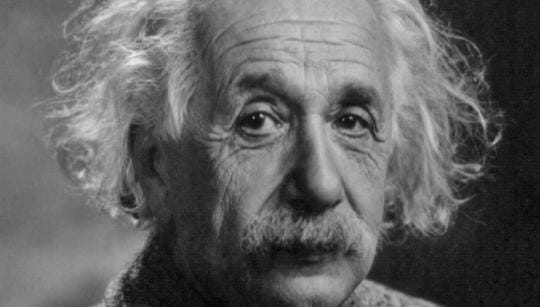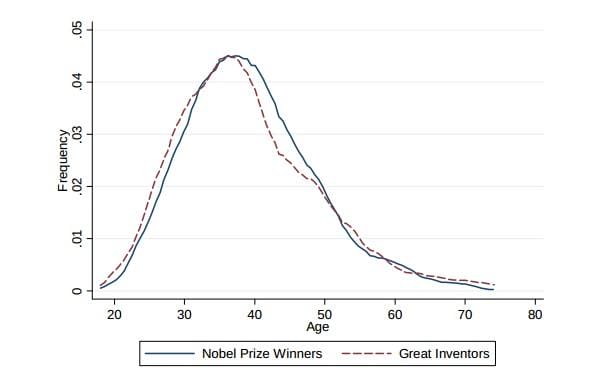
“A person who has not made his great contribution to science before the age of thirty will never do so.” -Albert Einstein
Does genius strike when the mind is still young and impressionable? Or are breakthroughs related to the arrival of white hairs and creaky knees? According to research by Benjamin Jones of the National Bureau of Economic Research, the answer is neither. Studying the ages of Nobel Prize winners and great inventors, Jones compiled the following graph:
Distribution of Ages at Which Breakthrough Research Was Performed

The average age at which great scientific breakthroughs are made hovers around 40 years old. (Although Nobel prizes honor entire careers, Jones looks at the age at which the Nobel Prize winning research was actually performed.) While Einstein made some of his greatest discoveries in his mid-20s, 93% of all Nobel winners and inventors were above the age of 26 when they hit science gold. And yet, it wasn’t the most seasoned and experienced scientists making the bulk of major discoveries. As Jones puts it:
“This research consistently finds that performance peaks in middle age: the life-cycle begins with a training period in which major creative output is absent, followed by a rapid rise in output to a peak, often in the late 30s or 40s, and a subsequent slow decline in output through later years.”
Jones offers a possible explanation for why middle-aged scientists do so well. Many major discoveries involve radical departures from conventional wisdom. “The ability to identify and appreciate these radical departures may be greatest shortly after initial exposure to a paradigm,” Jones writes, “before it has been fully assimilated and before the individual has produced a large body of work that either rests upon or contributes to that paradigm.” Getting a taste of how things are normally done, but not fully accepting them, may be the mother of invention.
The average age of discovery, however, varies based on field of study. Abstract fields like mathematics and physics have slightly younger innovators than more concrete fields like history and medicine.
So while it appears that it’s never really too late for genius to strike, with the sweet spot probably around the age of 40, geniuses who want to be young prodigies may need to pick their field with care.
To get occasional notifications when we write blog posts, sign up for our email list. Photo by The Conversation.



